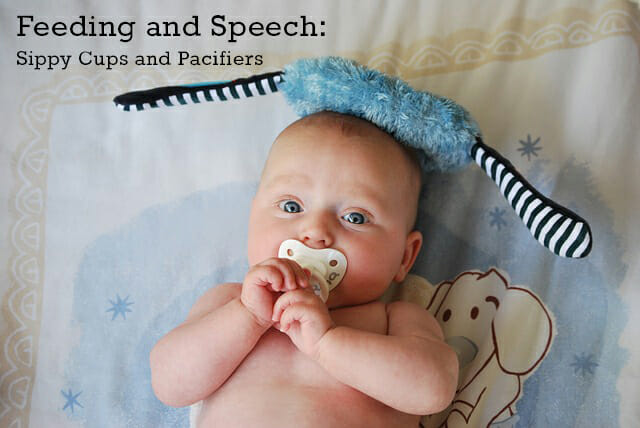This summer, we’re publishing a series of blog posts with a focus on issues related to feeding – how to know what’s normal for your infant and toddler or when to seek help. This week’s installment focuses on pacifiers and sippy cups. Our two earlier posts were on bottle and breast feeding troubles and reflux and spoon feeding; our next post will cover picky eaters.
Pacifier use is a nonnutritive way to help practice sucking for breast/bottle feeding and is a comfort that helps calm and settle babies and toddlers. Sippy cups are convenient and helpful with reducing spills. While both pacifiers and sippy cups are great supports for children (and parents), there are some definite drawbacks to prolonged use when it comes to speech, language and feeding development.
8 Quick Questions to Consider on Pacifiers and Sippy Cups:
- How often does your child use their pacifier or sippy cup?
- Are you using the pacifier when your child is content?
- Do you have plans to wean your child from her pacifier?
- Is your child over a year and attempting to speak? Does he keep the pacifier in his mouth when babbling/speaking?
- Do you allow your child to have unlimited access to her sippy cup? Is she sleeping with her sippy cup?
- Can your child drink from a straw? What about an open cup (with assistance)?
- Do you notice your child’s tongue sticking out/protruding at rest?
- Is your child substituting /t/ for /k/, /d/ for /g/, /th/ for /s/or /z/ in their speech?
Cons to Prolonged Use of Pacifiers (after 15 months) & Sippy Cups:
- Dental malocclusions (abnormal alignment of teeth)
- Improper resting position of tongue
- Increased incidence of otitis media (ear pain or inflammation)
- Delayed development of muscles needed for mature swallow pattern & speech
- Possible delay in speech development/reduced attempts to speak
- Distortion of speech sounds
Feeding issues and speech delays go hand-in-hand and can begin to “chip away” at life skills, so it’s important to address any problems early on. If you feel your child could have issues related to the pacifier or sippy cup, consider talking to a licensed speech pathologist/feeding specialist. Many of our speech therapists at Kid’s Creek Therapy also have feeding experience. If you or someone you know would like to learn more about how we can help your child, contact us for a free consultation.
Jessica Orlick, MS, CCC-SLP
Photo Courtesy of Ben Kerckx/Pixabay. Title banner added.








